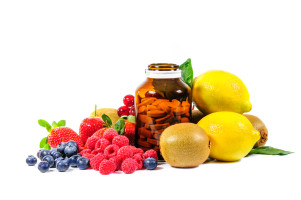-
Diet Tips & Supplements to help with Varicose and Spider Veins
Posted on December 9, 2015 by in port charlotte vein treaments “Let thy food be thy medicine.” – Hippocrates
“Let thy food be thy medicine.” – HippocratesWhen possible, dietary changes are a wonderful and natural way to help heal and correct many conditions. By making a few additions and changes to your eating habits severity of varicose and spider veins may be able to be reduced.
Eating a diet high in fiber can help to prevent pressure associated with constipation by keeping you more regular. Time spent sitting and straining in association with this issue is reduced, reducing the added pressure on your pelvic and leg veins.
30 grams of fiber is the daily recommended intake for adults. To work more fiber into your daily diet it is helpful to build your meals around whole grains, legumes, fruits and vegetables, adding foods rich in compounds that may prevent varicose veins or lessen the discomfort that they can cause, such as blackberries and cherries.
Other helpful suggestions:
Vitamin A (beta carotene) 25,000 IU daily. Helps fortify integrity of cells and speed varicose vein and ulcer healing.
Vitamin B Complex + 1 Spoonful of Brewer’s Yeast daily helps maintain strong blood vessels.
Vitamin C and Bioflavonoids 1,000 to 5,000 milligrams of vitamin C and 100 to 1,000 milligrams of bioflavonoids in divided daily doses to aid circulation, promote the healing of sores, and strengthen vein walls to prevent dilation.
Vitamin E 300 to 800 IU gradually increasing in dosages to help improve circulation, reduce susceptibility to varicose veins and relieve pain. Topical applications of vitamin E squeezed from capsules often relieves localized irritation and speeds the healing of varicose ulcers. (Please note: Although the Daily Value for vitamin E is safe for most people. If you have moderate coagulation factor deficiency, don’t follow this. It can cause dangerous bleeding in people who have this condition.)
Lecithin One tablespoon or two capsules with each meal. Lecithin helps to emulsify fat & assist the circulatory system.
Rutin (a bioflavonoid) is used routinely to treat varicose veins. It is present in many foods, including blackberries, citrus fruits, apricots, blueberries, cherries, buckwheat and rose hips. Quercetin (also a bioflavonoid), has also shown promise in treating varicose veins.
Cell Salts (a homeopathic remedy) use as instructed on the package to improve the elasticity of blood vessel walls.
Zinc 50 milligrams daily. Zinc helps to assist with collagen and healing.Beneficial Foods to Eat: fresh fruits, berries and cherries, citrus fruit (including the inside of the rind), whole grains (especially buckwheat and millet), garlic, onions, ginger, and cayenne pepper. Fish.
Foods to avoid: Sugar, salt, alcohol, fried foods, processed and refined foods, animal protein including red meat, cheeses, and ice cream. Lowering your intake of carbohydrates and fats may prove helpful.
Supporting your system the natural way can not only assist in alleviating or preventing vein issues, it can also help you to build and support your immune system. Along with these suggestions we also highly recommend having a FREE Vein Screening assessment done
We would like to invite you to give us a call today (239) 694-VEIN and set up a consultation. Let Dr. Joseph Magnant, M.D. experienced Fort Myers and Bonita Springs Vein Specialist assist you in achieving optimal circulatory health. With offices at two convenient locations – 1510 Royal Palm Square Blvd. Suite 101 Fort Myers, Florida 33919 or 3359 Woods Edge Circle Suite 102 Bonita Springs, Florida 34134.
For your convenience you can also visit our website www.weknowveins.com to set up a Virtual FREE Vein Consultation.






